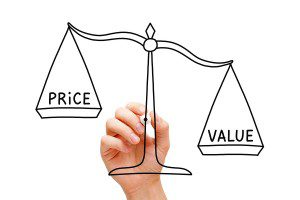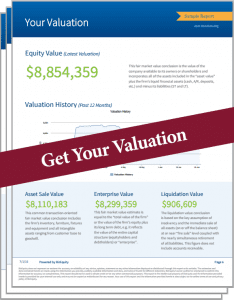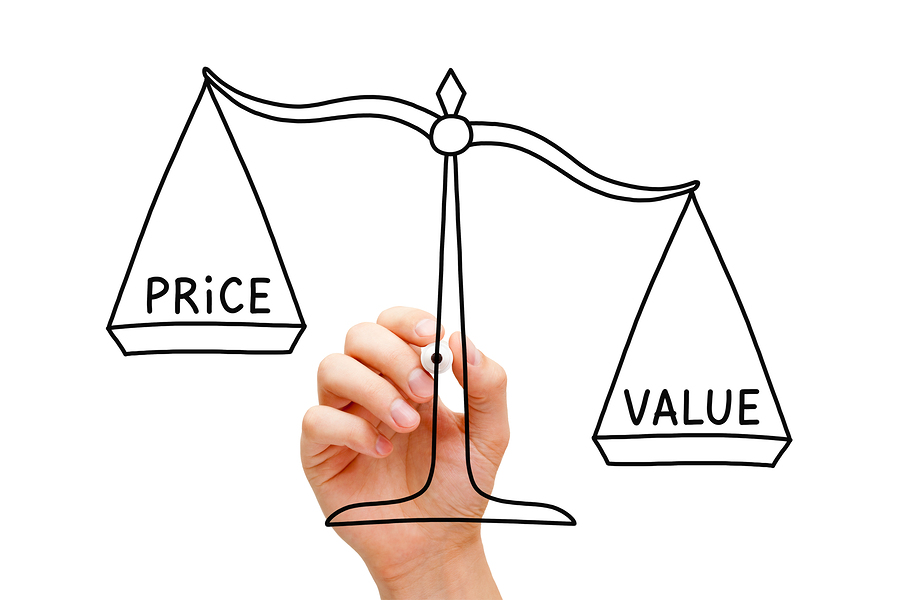- Maximizing After Tax Proceeds When Selling Your Business - June 7, 2024
- Understanding the Accredited Investor Rule 501 of Regulation D - February 27, 2024
- Which is Best – Business Broker, M&A Advisor, or an Investment Banker? - October 2, 2023
 As a business owner journeys through entrepreneurship, it’s inevitable for most to seek a quick business valuation on one or more occasions. Such a conversation with a business advisor may be about the need to understand the value of the business for the purpose of funding an insurance policy to support a cross-purchase or buy-sell agreement. Or it may be one of the owners is facing a divorce or desires to transfer some or all of his business interest to family members and needs to determine the value of a business.
As a business owner journeys through entrepreneurship, it’s inevitable for most to seek a quick business valuation on one or more occasions. Such a conversation with a business advisor may be about the need to understand the value of the business for the purpose of funding an insurance policy to support a cross-purchase or buy-sell agreement. Or it may be one of the owners is facing a divorce or desires to transfer some or all of his business interest to family members and needs to determine the value of a business.
For a business owner considering the possibility of exiting, asking advisors how much is my company worth is wise. That said, not all business owners have access to an advisor educated and experienced in the practice of preparing business valuations. Furthermore the cost of such professional services may simply be out of reach.
One of the most basic questions asked by business owners – both small business owners and middle-market business owners alike – is “what is the value of my business?”
There are many ways to go about answering this important question and the purpose of this post is to provide business owners with a comprehensive overview and available resources to enable them to make an informed choice.
Company Valuation Methods
Before we address how to find out how much a business is worth, it’s very important to understand that not all valuations are equal because company valuation methods vary and several measurements of income are used. We’ll start by identifying the various business valuation methods first:
Discounted Cash Flow Valuation Method
Although most business owners won’t be too excited about this method, in its simplest terms, the discounted cash flow valuation method values a business based on its anticipated future cash flow discounted back to today’s dollars. If this makes your head spin, not to worry. This method is normally reserved mostly for middle-market businesses, venture capital or private equity investments, and initial public offerings (IPOs). Small businesses with revenue less than $5 Million generally are valued under one of the Multiples Methods and adjusted based on comparable industry transactions.
Business Valuation Multiples Method
The three most common multiple methods for small businesses use a measurement of income (or profit produced by a given business to provide resources to capitalize the business and income to its owners) that is multiplied by a factor. The factor applied to the measurement of income varies widely by industry and other outside circumstances or business conditions such as the current prevailing interest rates investors may earn on other, less risky investments.
It’s easy to understand why there is no such thing as a single formula to value a business. There are simply too many variables that enter into the computation. Nonetheless, now let’s review the three basic measurements of income to which multiples are applied in order to compute the value of a business:
Seller’s Discretionary Earnings
This is the amount of cash a business owner (or business seller) has access to from the operation of his business. The SDE measurement is typically used when a main street business is available for sale and when the business may not have the need to maintain a balance sheet because income and expenses are reported on the business owner’s personal tax return (Schedule C).
EBITDA – Earnings Before Interest, Taxes, Depreciation and Amortization
This measurement of income may be adjusted for one-time expenses or personal expenses which may flow through the business’ books.
EBIT – Earnings Before Interest and Taxes
This measurement is similar to EBITDA and it also may be adjusted to more accurately represent the cash flow a business produces. EBIT differs from EBITDA in that it accounts for the capital expenditures necessary to operate the business by excluding (or not adding back) the depreciation and amortization expense related to capital expenditures.
Company Valuation Based on Revenue
An alternative to the Discounted Cash Flow and Multiples methods is when a business value is estimated simply by knowing its gross revenue and the appropriate industry multiple. This business valuation methodology is often used when valuing a business in a service industry. Professional firms such as accounting, technology support, and law practices use this rough estimation of value by applying the firm’s gross revenue by its industry’s multiplier. Again, it’s important to understand the multiple applied to the gross revenue measurement when valuing a service company based on revenue will vary by the applicable industry. Other factors, such as recurring revenue vs. one-time transaction revenue, will increase or decrease the applicable industry multiple.
Small Business Valuation Multiples
When pricing a business or franchise for sale, it’s very important to understand how its industry value is perceived. Similar to a home in one neighborhood with the same number of bedrooms and baths plus an updated kitchen will differ from the same home in another neighborhood, the small business valuation multiples will be driven mostly by the industry in which the business operates. And every industry has its own nuances. One may be heavy on inventory while another may be heavily leveraged with debt. This means the same amount of net income (cash flow, EBITDA, EBIT, etc.) derived from a business in one industry will result in a different business value from a business in another industry.
Valuation Company Services
Business owners may need to hire a valuation company which employs certified valuation specialists to prepare a written valuation report for a legal or tax purpose. This is especially true when a business is being transferred from family member to another family member as part of an estate planning and/or gifting strategy. It’s also necessary when a business chooses to change its federal tax treatment or transfer assets from one business to another in a tax-free exchange. Such valuation services typically take several weeks, or even months, to complete the work and prepare the written report. The cost for such services for small-to-medium sized business is approximately $3,000 to $10,000 and is dependent on the size and complexity of the business being valued.
These valuation specialists may have credentials such as:
- CVA (Certified Valuation Analyst by the National Association of Certified Valuation Analysts),
- ABV (a Certified Public Accountant who has been Accredited in Business Valuation),
- CBA (Certified Business Appraiser by the Institute of Business Appraisers), and
- ASA (Accredited Senior Appraiser by the American Society of Appraisers), among others.
Online Business Valuation Services
Similar to many other industries, the business valuation industry is not immune to disruptors due to advances in technology. Business owners now have the opportunity to use online business valuation calculators to obtain an up-to-date valuation for their business.
Many of the online business valuators offer business owners a quick business valuation and insights as to what a business owner may do proactively to improve the value of their business.
Business Valuation Report
A written business valuation report may be as simple as a calculation report or as detailed as a professional appraisal report prepared by a professional valuation advisor. 
When a business owner simply wants to know the answer to the question “what is my company worth?”, hiring a professional to compute the value and to produce a massive, written business valuation report may be overkill. It certainly may also be out of the question, given its cost.
On the other hand, a business owner may understand the importance of knowing the various business values pertinent when contemplating the sale of his business. When selling a business, the business has four values which usually are relevant and should be considered carefully. Those are:
- Asset Value – Typically small businesses are sold under an asset purchase agreement where only the inventory, supplies, fixed and intangible assets are sold. Cash and Accounts Receivable are normally retained by the seller in such a sale.
- Equity Value – Few small businesses are sold under this arrangement, known as a stock purchase agreement or equity sale. In this type of sale, the entire business entity is sold to the new owner and the seller retains nothing from the business.
- Enterprise Value – This business value is most often applicable to middle-market businesses where the level of debt has a big impact on the business and investors are comparing several companies.
- Liquidation Value – The key assumption in this value is insolvency and the immediate need to sell all assets related to the business while nearly and simultaneously retiring all liabilities.
Conclusion:
If you’re like most business owners, there will be a time when you need to value your business and there will be many times where you will simply wonder “what’s my business worth?”
The world of business valuation has been hidden behind closed doors for several decades and now technology and improved access to information across multiple industries has opened up new ways for business owners to answer this burning question.
Whether you’re the type of business owner who loves to read textbooks on the topic of financial ratios and accounting metrics, prefers to learn about your industry’s valuation multiples or are willing to enter your own data into an online business valuation calculator, access to learning about your business’ value and what you can do to improve it is now available to all.
And of course if you’d rather leave the business valuation question to the professionals, that’s always an option. Tell me about your business valuation journey. I’d love to learn what’s worked well (or not so well) for you!













